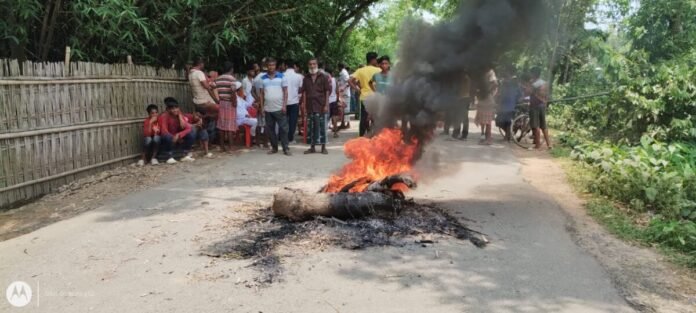The township of Lakshmipur has become the focal point of simmering discontent as residents take to the streets to protest against inadequate infrastructure, particularly the lack of proper drainage and deteriorating road conditions. Frustrated by years of neglect and unfulfilled promises, residents have resorted to drastic measures, staging blockades and burning tires to draw attention to their plight and demand immediate action from authorities.
Located in the southern part of Tripura, Lakshmipur is a bustling township teeming with life and activity. However, beneath its veneer of vibrancy lies a tale of systemic neglect and infrastructure decay that has long plagued the lives of its residents. The absence of adequate drainage systems exacerbates during the monsoon season, leading to waterlogging, flooding, and the proliferation of waterborne diseases. Similarly, the deteriorating state of roads poses hazards to both pedestrians and motorists, impeding mobility and economic activities.
Faced with these perennial challenges, residents of Lakshmipur have reached a breaking point, venting their frustrations through peaceful protests and civil disobedience. Blockades, characterized by burning tires and impassable roadways, serve as potent symbols of the community’s collective outrage and determination to effect change. With slogans demanding “proper drainage” and “road repair,” residents are making their voices heard, demanding accountability from elected representatives and government agencies.
The grievances aired by Lakshmipur residents are not isolated incidents but symptomatic of broader issues of governance, accountability, and resource allocation that plague many urban centers in Tripura. Despite being endowed with natural resources and human capital, municipalities across the state grapple with inadequate infrastructure, poor service delivery, and a lack of transparent and accountable governance mechanisms.
In response to the mounting pressure, local authorities have initiated dialogues with residents and promised swift action to address their concerns. Plans for comprehensive drainage systems and road repair projects have been tabled, accompanied by assurances of transparent and accountable implementation. However, for many residents, such promises ring hollow, echoing previous commitments that failed to materialize into tangible improvements on the ground.
The standoff between residents and authorities underscores the urgent need for effective governance structures and mechanisms that prioritize citizen participation, accountability, and transparency. Meaningful engagement between elected representatives, government agencies, and civil society is essential for identifying community needs, allocating resources efficiently, and monitoring the implementation of development projects.
Moreover, the grievances expressed by Lakshmipur residents highlight the imperative of prioritizing basic infrastructure and essential services in urban planning and development agendas. Proper drainage systems and well-maintained roads are not luxuries but essential prerequisites for public health, safety, and economic prosperity. Investing in resilient infrastructure that can withstand the vagaries of climate change is imperative for building sustainable and inclusive cities in Tripura.
Furthermore, the protests in Lakshmipur underscore the importance of fostering a culture of dialogue, negotiation, and conflict resolution in addressing grievances and fostering social cohesion. Rather than resorting to violence or coercion, both residents and authorities must engage in constructive dialogue and negotiation to find mutually acceptable solutions to pressing challenges.
In the broader context of Tripura’s development trajectory, the protests in Lakshmipur serve as a wake-up call for policymakers, planners, and administrators. They underscore the need for a paradigm shift in urban governance towards a more inclusive, participatory, and responsive model that prioritizes the needs and aspirations of citizens, particularly those from marginalized and underserved communities.
As the protests in Lakshmipur continue to unfold, they serve as a poignant reminder of the power of grassroots mobilization and collective action in effecting change. By amplifying their voices and asserting their rights, residents of Lakshmipur are not only demanding better infrastructure but also holding authorities accountable for their actions and decisions. In doing so, they exemplify the spirit of democracy and civic engagement that is essential for building a more just, equitable, and sustainable future for all residents of Tripura.


